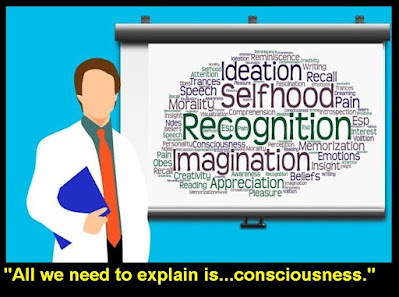It is a very great fallacy of try to reduce the problem of human mentality (the problem of explaining human minds and human mental phenomena) into some super-shrunken problem called "the problem of consciousness," or maybe "the problem of experience." The people who try to do such a thing are like someone who tries to reduce astronomy into a mere problem of explaining comets. Just as explaining comets is only a tiny sliver of the job of astronomy, explaining consciousness is only a tiny sliver of problem of explaining minds.
The silliness of people who pose a mere "problem of consciousness" or "problem of experience" rather than a problem of human mentality is illustrated in the visual below. The word cloud on the screen shows a vast diversity of mental things to be explained: imagination, selfhood, ideation, appreciation, memorization, morality, recognition, consciousness, emotions, speech, comprehension, creativity, recall, insight, beliefs, reminiscence, trances, introspection, pleasure, pain, reading, writing, awareness, perception, knowledge, recognition, attention, personality, fascination, interest, visualization, ESP, dreaming, volition, OBEs and NDEs. But the person in front of the screen has foolishly ignored this great complexity and phenomenal diversity, and has wrongly stated that all that he needs to explain is consciousness.
Recently we had the publication of an essay by a physicalist who offers an attempt to solve what his essay describes as the problem of consciousness, with what his essay brags is an "ingenuously simple solution" to such a problem. The physicalist attempted to explain the mind like this:
(1) He attempts to reduce a human mind to a mere perception of external objects.
(2) He then says that your perceptions are simply the objects you are perceiving.
Voila! Through such lunacy, the mind is eliminated. According to the physicalist, you simply are what you perceive. So when you look at some dog poop, you are the dog poop.
This is very crazy indeed. Yes, you have perceptions, but you also have a mind, that includes beliefs, memories, ideas, knowledge, and many other things. There is nothing known in the physical world that corresponds to such things. No one has ever been able to observe beliefs, memories, ideas or knowledge in the human brain, and any one claiming to see such things in a brain is just someone seeing what he wants to see, like someone seeing the face of Jesus in his toast.
Our physicalist writes this:
"So what is your experience? It is the subset of physical objects taking place relative to your body. The mind is identical with the (relative) object."
I notice a very big error in the quote above. We first have a question "what is your experience?" The answer then refers to "the mind," as if a mind is mere experience. No, a mind is an extremely diverse reality vastly more than just "your experience." Your experience is partially a stream of sensations that changes from day to day and hour to hour. Your mind is a stable thing that includes very much knowledge that persists from year to year, as well as beliefs and attitudes that can stay the same year after year. Your mind is vastly more than just your experience, and your mind is vastly more stable than your experience, which changes from hour to hour.
Our physicalist states that his theory "has no place either for ideas or thinkers, only for relative objects that bring each other into existence by means of mutual causal relations." This is just a very silly form of reality denial. There really are ideas and thinkers, and any philosophy of mind that "has no place" for them is nonsense. The idea that there are no ideas is just itself a very dumb idea, like denying the existence of the sun and the moon. Our physicalist is like a person who has written a book trying to prove there are no such things as books.
What about all the mental realities other than perception? Our physicalist who has denied all such things makes a feeble attempt to make his denials not so embarrassing by claiming that imagination is a "special case" of perception. No, imagination is not a "special case" of perception. Perception is when you see things with your eyes open. Imagination (which can be entirely non-visual) is when you can get ideas about things you may have never seen. Imagination can involve eyes-closed visualization of something you have never seen. Or imagination can involve something that is not at all visual. I may imagine the abstract idea that an extraterrestrial civilization might be killed by a cosmic gamma ray burst, without having any visual image associated with such a thing. Imagination is not perception, and is not a "special case" of perception.
Our physicalist then refers to intentionality, first-person perspective and self-consciousness, and claims that these are mere "epicycles." His references to epicycles is extremely inappropriate. In the philosophy of science, an epicycle refers to some imaginative and not-very-plausible hypothetical detail dreamed up to explain some shortfall in your theory. Things such as intentionality and first-person perspective and self-consciousness are not imaginative hypotheses but indisputable realities, and they were not invented to help anyone solve shortcomings of theories.
What's going on in the physicalist's essay is mainly just massive reality denial, done in the service of physicalism (the utterly erroneous belief that nothing exists but the physical). He says that his theory of the mind "has no place for anything but objects in relation to each other (relative objects)." That's the most massive kind of reality denial, because so much of reality is reality other than "objects." Physicalism should come with a warning label like this: "CAUTION: This philosophical assumption can lead to reality denial a thousand times more severe than Holocaust denialism." Because physicalism is a position radically opposed to the massive irrefutable reality of human mental experience that is not physical, many a physicalist will become the most extreme type of denialist.
The physicalist's reasoning I have mentioned is an example of what you might call "desert-island reasoning." By "desert-island reasoning" I mean the kind of armchair reasoning someone might do after being stranded alone on a desert island, without having access to any books or communication devices. Desert-island reasoning is not based on studying the details of human experience or the details of the human body or the details of the physical universe. A good sign you have some desert-island reasoning is when you get a long essay (like the one I have quoted from) that does not include any mention of specific facts or the experiences of specific people, and does not include a link to any external writing. Desert-island reasoning will not get you very far in understanding minds. To get some good ideas about what a human mind is:
(1) Study at great length the vast diversity of human experience, including anomalous human experiences and anomalous medical case histories.
(2) Study at great length the organization and functional complexity and vast diversity of engineering effects in human bodies and in other organisms.
(3) Study neuroscience and the behavior of neuroscientists with a very close examination of the current methodological shortfalls of neuroscientists, a close examination of the church-like belief community conformism and overconfidence of neuroscientists, and also a very close examination of the many physical shortfalls of the human brain that undermine claims that the brain is the source of the mind and the storage place of memories.
(4) Study the sudden origin of the universe and the evidence for enormous fine-tuning in the fundamental constants and laws of the universe.
(5) Study carefully the biggest mysteries science has not been able to explain, such as the origin of life and the progression from a speck-sized zygote to a full human body.
All of this studying and additional thought may lead you to eventually get some good ideas about the nature of the human mind, perhaps something like what I discuss here. You won't get very far by lazily ignoring such studies, and by merely trying to use a little armchair reasoning to get some "ingeniously simple solution" to long-standing problems of the mind.



No comments:
Post a Comment